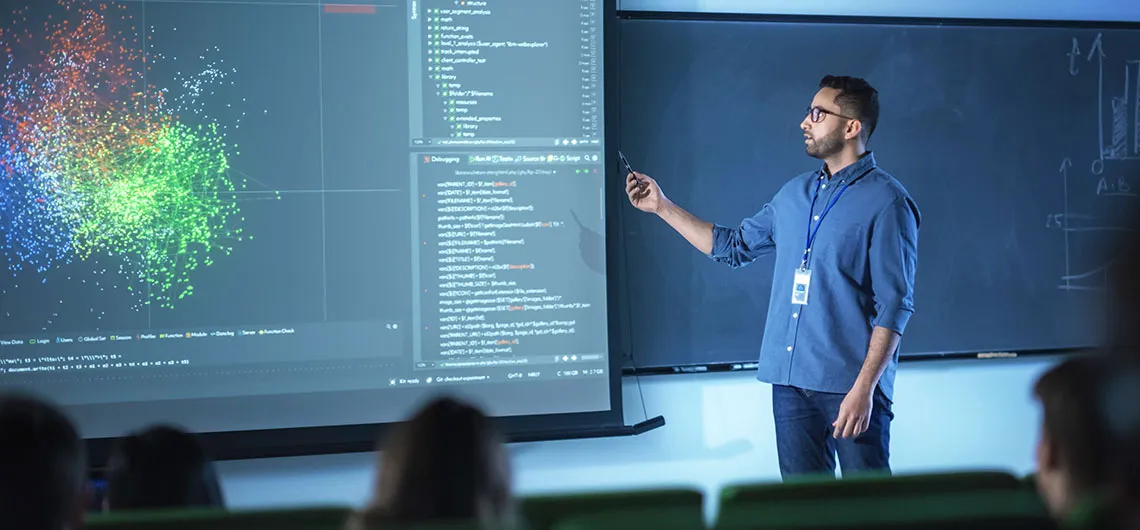
The University of Arizona MS in Data Science, ranked the #4 program in the nation by Fortune, empowers students with the in-demand skills they need to transform data into actionable insights through data collection, exploration, analysis and manipulation.
The STEM-designated degree, which is offered at our main campus in Tucson, Arizona and online, requires 30 total units and can typically be completed in 18 months for full-time students.
MSDS Student Competencies
Students who graduate from the University of Arizona MS in Data Science will have the following competencies:
Competency 1
Students will establish the ability to exercise the four key techniques of computational thinking: decomposition, pattern recognition, abstraction, and algorithms.
Competency 2
Students will obtain the skills of collecting, manipulating, and analyzing different types of data at different scales, and interpreting the results properly.
Competency 3
Students will acquire the skills to communicate the results of their work to interdisciplinary teams, using appropriate visualizations, multi-media, or artistic performance.
Competency 4
Students will demonstrate an understanding of information and data ethics, including ethical and legal requirements of data privacy and security, and the values of the information fields to serve diverse user groups.
Master's Plan of Study
As an MSDS student, you will work with your faculty advisor to develop a Master’s Plan of Study during your first few months in the program. The Plan of Study, which must be submitted to the Graduate College no later than your second semester in the program, identifies:
- Courses you intend to transfer from other institutions (if any)
- Courses already completed at the University of Arizona which you intend to apply toward the graduate degree (if any)
- Additional coursework to be completed to fulfill degree requirements
The Plan of Study must have the approval of the director of graduate studies before it can be submitted to the Graduate College.
Questions about GradPath should be directed to Holly Brown, director of graduate programs and global student services, at brownhb@arizona.edu.
Course Transfers
A maximum of 6 units can be transferred toward your MSDS from other institutions. Please reach out to the program advisor over email and provide (1) the list of courses that you’d like to transfer, (2) the closest course to each of the potential transfers in the list of pre-approved courses and (3) the syllabus for each of the courses that you are intending to transfer.
Curriculum
The following curriculum is effective Fall 2024. View the curriculum applicable to MSDS students admitted for Fall 2023, Spring 2024 or Summer 2024 in the appropriate section below.
MSDS students will take the following four required core courses:
Students have the choice of completing the MSDS alone or using sets of courses in order to attain one or more graduate certificates at the same time. Please see corresponding units' web pages for more information about their graduate certificates (e.g., Linguistics). Learn more about the Graduate Certificate in Foundations of Data Science or visit our Graduate Certificates page for more information about all College of Information Science graduate certificates.
Any non-core courses with the INFO prefix or out-of-department courses are also considered electives.
Elective courses include:
Complete a total of 3 units for the required internship or capstone project:
Internship or Capstone Project
Either an internship or a capstone project for a total of 3 units is required as part of the MSDS. A maximum of 6 units of experiential coursework (capstone or internship) can be applied toward graduation.
Internship
Capstone Project
The 1- to 3-unit MSDS capstone project is an opportunity for students to showcase what they have mastered in the program. It is based on a project plan that includes project goals, master's competencies addressed by the project, system design, implementation schedule, assessment plan and milestones. The project contributes to the development and enforcement of the student's knowledge and skill sets in the field of information science.
The capstone project must exercise all competencies required for the MSDS and must also have a software development component. Students will deposit capstone project code in GitHub or another source code repository.
View recent capstone project summaries, including keywords and faculty advisors.
MSDS Degree Requirements
for Students Admitted Fall 2023 - Summer 2024
MS Data Science students who began their program in Fall 2023, Spring 2024 or Summer 2024 have different requirements from those above:

